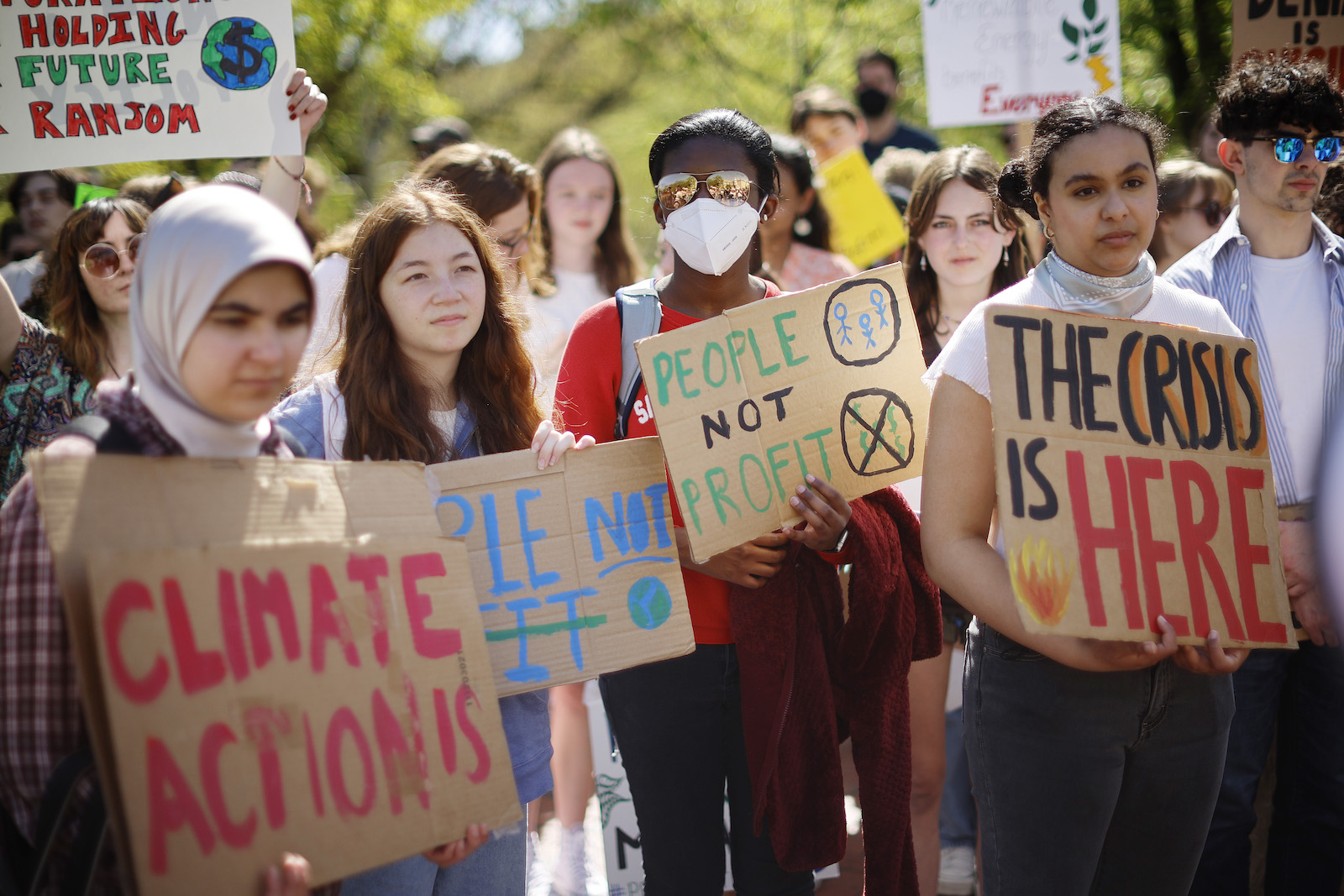This story was originally published by High Country News and is reproduced here as part of the Climate Desk collaboration.
In Montana, wildfires are destroying ranchland, drought is killing fish, and heat is harming traditional tribal food sources like huckleberries. To the south, Utahns are inhaling a toxic concoction of tailpipe and smokestack emissions, made worse by wildfire smoke. And young Westerners say these states are infringing on their rights by boosting fossil fuel development and causing the changes in the climate that accelerate these problems.
The West is a hotspot for lawsuits arguing that climate change-inducing policies are at odds with state constitutions: Three out of five pending state climate cases brought by young plaintiffs originated in the Western United States. In March, several young Utahns filed a complaint in Utah’s Third Judicial Court, declaring that dangerous air quality and climate change are harming their health and safety, interfering with their development, and shortening their life expectancy. A similar case in Montana made news earlier this year, when a court date was set for February 2023. This is a new wave of narrowly tailored youth climate cases that could, unlike earlier cases, lead to some legal wins.
Held v. Montana marks the first time in U.S. history that a youth-led climate change lawsuit will go to trial, and Natalie R. v. State of Utah could follow suit. Both cases face a legal system that has for years stymied and punted on similar cases, including their best-known predecessor, the federal case Juliana v. United States, along with state litigation from Alaska to California.
“I think that everyone just has to keep trying different approaches to see what ultimately will be the thing that courts can latch onto,” said Jennifer Rushlow, associate dean for environmental programs at Vermont Law School.
In Juliana, youth plaintiffs — the vast majority of them Westerners — wanted the court to order the federal government to adopt a plan to decrease greenhouse gas emissions. But the Ninth Circuit Court of Appeals dismissed the case in 2020, writing that the request was outside its authority and that climate policies must come from the legislative and executive branches, not the judiciary.
So lawyers for the Utah and Montana plaintiffs are now taking a narrower approach, asking for what’s called “declaratory relief,” or court rulings declaring that the state’s policies violate the rights of those bringing the cases. (Juliana plaintiffs are now taking the same approach in an amended complaint pending in Oregon U.S. District Court.) A victory would mean that state governments in Montana and Utah couldn’t legally continue specific policies that maximize, promote, and authorize fossil fuel development. The Montana case also contends that the states must take action on climate change due to the public trust doctrine, a legal concept that says natural resources should be held in trust by governments and managed for the benefit of both current and future citizens.
The lawyers for the two lawsuits are also tailoring their arguments to fit differing legal landscapes. Attorneys representing the plaintiffs in Held v. Montana argue that two Montana fossil fuel-friendly policies violate the right to “a clean and healthful environment.” Montana is one of six states — and the only one in the West — with constitutionally based environmental rights protections.
“Courts in Montana have interpreted the right to a clean and healthful environment to be really important and meaningful, and have shown a willingness to invalidate statutes and agency conduct when it violates that right,” said Nate Bellinger, senior staff attorney at Our Children’s Trust, an Oregon nonprofit law firm that solely represents youth plaintiffs in climate cases. Experts agree that explicit constitutional language could help youth climate cases win.
“It certainly is possible that the existence of a constitutional right will give an individual judge some greater comfort in making a bold decision,” said Michael Burger, the executive director for the Sabin Center for Climate Change Law at Columbia Law School.
Utah’s Constitution lacks explicit language on the right to a clean environment. So the young plaintiffs in Natalie R. v. State of Utah argue that five Utah policies bolstering fossil fuels create conditions that violate their right to life, health, and safety per the state constitution — and they’re leading the fight because younger generations will bear the brunt of climate impacts. While the Montana case covers a litany of climate concerns, the Utah case focuses on air pollution.
“We know that Utah’s dangerous air quality is taking years off of the lives of its citizens, particularly children,” said Andrew Welle, a senior staff attorney on the case from Our Children’s Trust. “So we’ve drawn a direct line to say, ‘This is a pretty clear-cut violation of the right to life.’”
Federal litigation and nationwide climate action may stall, but state cases like these could bring piecemeal progress. And that adds up.
“Even though climate change is a global problem and we need global coordination and federal leadership, ultimately, a lot of action is driven at the state level,” Burger said. “There are important, critical gains to be made in advocating for and achieving more ambitious state climate action.”



